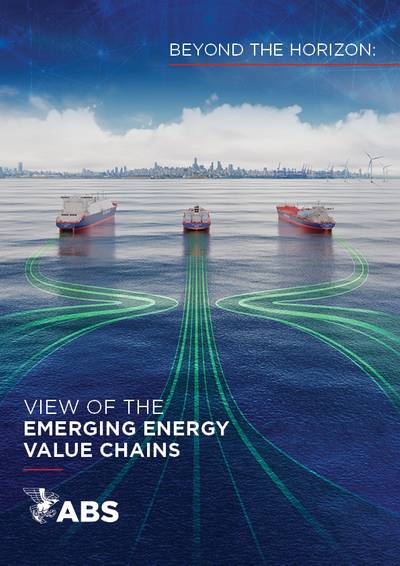ABS: Net Zero by 2050 is Possible
Carbon capture, energy efficiency and green fuels are the roadmap to net zero by 2050. That’s the pathway outlined by the 2023 Outlook, Beyond the Horizon: View of the Emerging Value Chains, the latest industry-leading research from ABS into shipping’s progress on the green energy transition.
Released at the ABS Sustainability Summit during London International Shipping Week, the report examines in depth the carbon, ammonia and hydrogen value chains. It concludes that the industry will need to accelerate investment in carbon capture technology, energy efficiency technologies and new fuels to achieve net zero by 2050.
“Our findings show there is a significant amount of work to be done between now and 2050 if we hope to hit net zero. But crucially, our research shows it can be done, and maps out a pathway for the industry to get there,” said Christopher J. Wiernicki, ABS Chairman and CEO. “Simply put, for shipping’s CO2 emissions to reach net zero, we will need to harness the potential of energy efficiency improvement technologies to reduce aggregate fuel consumption by 15% on the existing fleet and newbuild vessels. At the same time, we will need carbon capture rolled out across much of the oil burning fleet, reducing onboard CO2 emissions by 70%. Those that do not or cannot adopt carbon capture will need to switch to e-diesel or zero-carbon biofuels.”
Vessels with conventional single-fuel engines will still be constructed until well into the next decade. As a result, widespread adoption of retrofitting of energy-saving and carbon capture technologies will be required for the shipping industry to meet its targets.
The report also considers the obstacles and opportunities for adoption of alternative fuels and the actions shipowners must take in order to secure their future fuel supply chain. Growing demand for higher volumes of synthetic and green bunkers will be matched by competition for these fuels by other industry sectors.
As a result, it will be essential that shipping companies demonstrate to fuel producers that sufficient demand exists to justify investment in production, pooling their buying activity in order to secure sufficient volumes.
The research highlights how shipping will play a pivotal role in the global clean energy transition.
“As the marine industry looks ahead and dives deeper into the complexities of these three value chains, the ABS Outlook makes it clear that maritime is more than a spectator in the global green energy revolution. Instead, it serves as a critical facilitator and enabler. The transportation of carbon, ammonia and hydrogen as cargo highlights the industry's significance in bridging the global energy landscape's gaps between production, storage and consumption,” said Wiernicki.
The Outlook models scenarios for the impact of decarbonization of the global economy on seaborne trade and the potential for shifting patterns of trade to reshape the global fleet. This includes falls in the aggregate share of the oil and chemical tanker and dry bulk carrier sectors and a growth in the container ship sector measured in gross tonnage terms.
The transition to low and ultimately net-zero carbon operations will require substantial investment that may change the dynamic of shipping’s commercial relationships. But in the longer term, shipping operations will benefit from reduced fuel use, lower emissions, higher asset values and simplified regulatory compliance.















